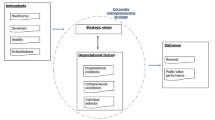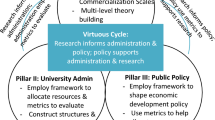Abstract
The purpose of the paper is to explore how an individualized incentive system could increase professors’ motivation to contribute to the university’s mission to become entrepreneurial in transition countries. The paper proposes a conceptual analysis that draws on the principal-agent problem to examine incentives that may stimulate institutional change. It considers the framework of a university becoming entrepreneurial and assumes that the principal is dean while the agent is a professor. It contributes to the national innovation system literature by providing new insights about the institutional change in transition countries. The contribution is threefold: it distinguishes between an ordinary and an entrepreneurial university, it explains relationship between micro and meso levels in the process of institutional change towards entrepreneurial university, it refines knowledge on individualized incentive system acting as a motivation for professors to contribute to university becoming entrepreneurial. The paper challenges studies that dismiss the micro level role of human agency in institutional change. The conceptual arguments have important managerial implications for all public and private institutions.


Source author’s calculations

Source author’s calculations

Source author’s calculations

Source author’s calculations
Similar content being viewed by others
Notes
We chose dean as the principal, because deans usually oversee faculty. However, the role of principal in the model could be assigned to other roles depending on the existing institutional structure since it varies country to country.
For example: “The mission of Tallinn University of Technology is to be a leading provider of engineering and economics education, as well as a leader in the fields of engineering sciences and smart technologies”. (https://haldus.taltech.ee/sites/default/files/2021-03/Strategic%20Plan%20of%20Tallinn%20University%20of%20Technology%202021-2025.pdf?_ga=2.118765578.2051660872.1622800682-1498313191.1622800682).
Drucker (1985) notes three such obstacles: public budget which is awarded based on needs and not on performance; public service agency has to satisfy everyone (compared to consumer who overrides everyone in private firm); seeing the mission as a moral absolute and not as an economic cost/benefits analysis (there is no higher yield).
Gibbs (1995) analyzes how middle managers are motivated in large corporations. He is also concerned with the adaptability of the incentive system to changing circumstances.
This definition of performance q was inspired by Gibbs’s (1995).
References
Arrow, K.J.: Essays in the theory of risk bearing. Markham, Chicago (1971)
Arrow, K.J.: The economics of moral hazard: further comment. The American economic review, 58(3), 537–539 (1968). Retrieved from http://0-www.jstor.org.wam.leeds.ac.uk/stable/1813786
Audretsch, D.: From the entrepreneurial university to the university for the entrepreneurial society. J. Technol. Transf. 39, 313–321 (2014). https://doi.org/10.1007/s10961-012-9288-1
Augier, M., Teece, D.J.: Dynamic capabilities and the role of managers in business strategy and economic performance. Organ. Sci. 20(2), 410–421 (2009). https://doi.org/10.1287/orsc.1090.0424
Beckert, J.: Agency, entrepreneurs, and institutional change. The role of strategic choice and institutionalized practices in organizations. Organ. Stud. 20(5), 777–799 (1999). https://doi.org/10.1177/0170840699205004
Benneworth, P., Pinheiro, R., Karlsen, J.: Strategic agency and institutional change: investigating the role of universities in regional innovation systems (RISs). Reg. Stud. 51(2), 235–248 (2016). https://doi.org/10.1080/00343404.2016.1215599
Bilic, I., Škokic, V., Lovrinčević, M.: Academic entrepreneurship in post-transition country—case study of Croatia. J. Knowl. Econ. 12, 41–55 (2021). https://doi.org/10.1007/s13132-017-0452-6
Breznitz, S.M., Feldman, M.P.: The engaged university. J. Technol. Transf. 37(2), 139–157 (2012). https://doi.org/10.1007/s10961-010-9183-6
Carayannis, E.G., Campbell, D.F.J.: ‘Mode 3’ and ‘Quadruple Helix’: toward a 21st century fractal innovation ecosystem. Int. J. Technol. Manage. 46(3–4), 201–234 (2009). https://doi.org/10.1504/IJTM.2009.023374
Clark, B.R.: Creating entrepreneurial universities: organizational pathways of transformation. Pergamon, New York (1998)
Cummings, C.: Fostering innovations and entrepreneurialism in public sector reform. Public Admin. Dev. 35(4), 315–328 (2015). https://doi.org/10.1002/pad.1735
De Cleyn, S.H., Braet, J., Klofsten, M.: How human capital interacts with the early development of academic spinoffs. Int. Entrep. Manag. J. 11(3), 599–621 (2015). https://doi.org/10.1007/s11365-013-0294-z
Dempster, G., Kluver, J.: Institutional entrepreneurship in health management: a survey experiment on appreciative inquiry. Stud. Bus. Econ. 14(1), 34–50 (2019). https://doi.org/10.2478/sbe-2019-0003
Demski, J., & Feltham, G.: Economic incentives in budgetary control systems. The accounting review, 53(2), 336–359 (1978). Retrieved from http://0-www.jstor.org.wam.leeds.ac.uk/stable/245898
DiMaggio, P.J.: Interest and agency in institutional theory. In: Zucker, L. (ed.) Institutional patterns and organizations, pp. 3–22. Ballinger, Cambridge, MA (1988)
Drucker, P.: Innovation and entrepreneurship: practice and principles. Routledge Taylor & Francis Group (1985)
Etzkowitz, H.: Research groups as ‘quasi-firms’: the invention of the entrepreneurial university. Res. Policy 32(1), 109–121 (2003). https://doi.org/10.1016/S0048-7333(02)00009-4
Etzkowitz, H.: Anatomy of the entrepreneurial university. Soc. Sci. Inf. 52(3), 486–511 (2013). https://doi.org/10.1177/0539018413485832
Etzkowitz, H.: The entrepreneurial university: vision and metrics. Ind. High. Educ. 30(2), 83–97 (2016). https://doi.org/10.5367/ihe.2016.0303
Etzkowitz, H., Leydesdorff, L.: The dynamics of innovation: from national systems and “mode 2” to a triple helix of university–industry–government relations. Res. Policy 29(2), 109–123 (2000). https://doi.org/10.1016/S0048-7333(99)00055-4
Etzkowitz, H., Ranga, M., Benner, M., Guaranys, L., Maculan, M.A., Kneller, R.: Pathways to the entrepreneurial university: towards a global convergence. Sci. Pub. Pol. 35(9), 681–695 (2008). https://doi.org/10.3152/030234208X389701
Fama, E., & Jensen, M.: Separation of ownership and control. The journal of law & economics, 26(2), 301–325 (1983). Retrieved from http://0-www.jstor.org.wam.leeds.ac.uk/stable/725104
Ferguson, D.L., Fernandez, R.E.: The role of the university in the innovation ecosystem, and implications for science cities and science parks: a human resource development approach. World Technopolis Rev. 4(3), 132–143 (2015). https://doi.org/10.7165/WTR2015.4.3.132
Garud, R., Hardy, S., Maguire, S.: Institutional entrepreneurship as embedded agency: an introduction to the special issue. Organ. Stud. 28(07), 957–969 (2007). https://doi.org/10.1177/0170840607078958
Gibbs, M.: Incentive compensation in a corporate hierarchy. J. Account. Econ. 19, 247–277 (1995). https://doi.org/10.1016/0165-4101(94)00384-H
Greenwood, R., Oliver, C., Sahlin-Andersson, K., Suddaby, R.: The SAGE handbook of organizational institutionalism. SAGE Publications, Thousand Oaks, CA (2008)
Guerrero, M., Urbano, D.: The development of an entrepreneurial university. J. Technol. Transf. 37(1), 43–74 (2012). https://doi.org/10.1016/j.respol.2008.04.016
Guerrero, M., Urbano, D., Cunningham, J., et al.: Entrepreneurial universities in two European regions: a case study comparison. J. Technol. Transf. 39, 415–434 (2014). https://doi.org/10.1007/s10961-012-9287-2
Guerrero, M., Urbano, D., Fayolle, A., et al.: Entrepreneurial universities: emerging models in the new social and economic landscape. Small Bus. Econ. 47(3), 551–563 (2016). https://doi.org/10.1007/s11187-016-9755-4
Heaton, S., Siegel, D.S., Teece, D.J.: Universities and innovation ecosystems: a dynamic capabilities perspective. Ind. Corp. Chang. 28(4), 921–939 (2019). https://doi.org/10.1093/icc/dtz03
Hoffman, A.J.: Institutional evolution and change: environmentalism and the US chemical industry. Acad. Manag. J. 42(4), 351–371 (1999). https://doi.org/10.2307/257008
Jensen, M.: Organization theory and methodology. The accounting review, 58(2), 319–339 (1983). Retrieved from http://0-www.jstor.org.wam.leeds.ac.uk/stable/246838
Karaulova, M., Shackleton, O., Liu, W., Gök, A., Shapira, P.: Institutional change and innovation system transformation: a tale of two academies. Technol. Forecast. Soc. Chang. (2016). https://doi.org/10.1016/j.techfore.2016.10.018
Kirby, D.A., Guerrero, M., Urbano, D.: Making universities more entrepreneurial: development of a model. Can. J. Adm. Sci. 28(3), 302–316 (2011). https://doi.org/10.1002/cjas.220
Kitanovic, J.: The applicability of the concept of national innovation systems to transition economies. Innov. Manag. Pol. Pract. 9(1), 28–45 (2007). https://doi.org/10.5172/impp.2007.9.1.28
Kolomytseva, O., Pavlovska, A.: The role of universities in the national innovation system. Baltic J. Econ. Stud. 6(1), 51–58 (2020). https://doi.org/10.30525/2256-0742/2020-6-1-51-58
Korosteleva, J., Belitski, M.: Entrepreneurial dynamics and higher education institutions in the post-communist world. Reg. Stud. 51(3), 439–453 (2017). https://doi.org/10.1080/00343404.2015.1103370
Kuzhabekova, A., Ruby, A.: Raising research productivity in a post-soviet higher education system: a case from Central Asia. Eur. Educ. 50(3), 266–282 (2018). https://doi.org/10.1080/10564934.2018.1444942
Leih, S., Teece, D.J.: Campus leadership and entrepreneurial university: a dynamic capabilities perspective. Acad. Manag. Perspect. 30(2), 182–210 (2016). https://doi.org/10.5465/amp.2015.0022
Leyden, D.P.: Public-sector entrepreneurship and the creation of a sustainable innovative economy. Small Bus. Econ. 46(4), 553–564 (2016). https://doi.org/10.1007/s11187-016-9706-0
Loogma, K., Tafel-Viia, K., Ümarik, M.J.: Conceptualising educational changes: a social innovation approach. J. Educ. Change 14(3), 283–301 (2013). https://doi.org/10.1007/s10833-012-9205-2
Lundvall, B.A., Joseph, K.J., Chaminade, C., Vang, J.: Handbook of innovation systems and developing countries. Edward Elgar Publishing (2009)
M’Chirgui, Z., Lamine, W., Mian, S., Fayolle, A.: University technology commercialization through new venture projects: an assessment of the French regional incubator program. J. Technol. Transf. 43(5), 1142–1160 (2016). https://doi.org/10.1007/s10961-016-9535-y
Merchant, K.A., Van der Stede, W.A., Zheng, L.: Disciplinary constraints on the advancement of knowledge: the case of organizational incentive systems. Acc. Organ. Soc. 28(2), 251–286 (2003). https://doi.org/10.1016/S0361-3682(01)00051-4
Meyer, J.W., Rowan, B.: Institutionalized organizations: formal structure as myth and ceremony. Am. J. Sociol. 83(2), 340–363 (1977). https://doi.org/10.1086/226550
Mussagulova, A.: Newly independent, path dependent: the impact of the soviet past on innovation in post-soviet states. Asia Pacific J. Pub. Administration 43(2), 87–105 (2020). https://doi.org/10.1080/23276665.2020.1805338
Nelson, R.R., Winter, S.G.: An evolutionary theory of economic change. University Press, Harvard (1982)
Niosi, J.: National systems of innovations are “x-efficient” (and x-effective): why some are slow learners. Res. Pol. 31(2), 291–302 (2002). https://doi.org/10.1016/S0048-7333(01)00142-1
North, D.: Economic performance through time. American economic review, 84(3), 359–368 (1994). Retrieved from https://www.jstor.org/stable/2118057
Passaro, R., Quinto, I., Thomas, A.: The impact of higher education on entrepreneurial intention and human capital. J. Intellect. Cap. 19(1), 135–156 (2018). https://doi.org/10.1108/JIC-04-2017-0056
Perrow, C.: Complex organizations. Random House, New York (1986)
Pinheiro, R., Stensaker, B.: Designing the entrepreneurial university: the interpretation of a global idea. Pub. Organiz. Rev. 14(4), 497–516 (2014). https://doi.org/10.1007/s11115-013-0241-z
Pinheiro, R., Benneworth, P., Jones, G.A.: Universities and regional development: a critical assessment of tensions and contradictions. Routledge, Milton Park and New York (2012)
Prendergast, C.: The provision of incentives in firms. J. Econ. Literature 37(1), 7–63 (1999). https://doi.org/10.1257/jel.37.1.7
Prendergast, C.: Intrinsic motivation and incentives. Am. Econ. Rev. 98(2), 201–205 (2008). https://doi.org/10.1257/aer.98.2.201
Ricci, R., Colombelli, A., Paolucci, E.: Entrepreneurial activities and models of advanced European science and technology universities. Manag. Decis. 57(12), 3447–3472 (2019). https://doi.org/10.1108/MD-11-2018-1237
Rosen, S.: Authority, control, and the distribution of earnings. Bell J. Econ. 13(2), 311–323 (1982). https://doi.org/10.2307/3003456
Ross, S.: The economic theory of agency: the principal’s problem. The American Economic Review, 63(2), 134–139 (1973). Retrieved from http://0-www.jstor.org.wam.leeds.ac.uk/stable/1817064
Rothaermel, F.T., Agung, S.D., Jiang, L.: University entrepreneurship: a taxonomy of the literature. Ind. Corp. Chang. 16(4), 691–791 (2007). https://doi.org/10.1093/icc/dtm023
Sanchez-Barrioluengo, M., Benneworth, P.: Is the entrepreneurial university also regionally engaged? Analysing the influence of university’s structural configuration on third mission performance. Technol. Forecasting Soc. Change 141(C), 206–218 (2019). https://doi.org/10.1016/j.techfore.2018.10.017
Schumpeter, J.A.: Capitalism, socialism and democracy. Routledge, London (1943)
Scott, W.R.: Institutions and organizations. Sage Publications, Thousand Oaks, CA (1995)
Secundo, G., Ndou, V., Del Vecchio, P., De Pascale, G.: Knowledge management in entrepreneurial universities. Manag. Decis. (2019). https://doi.org/10.1108/MD-11-2018-1266
Speckbacher, G.: The use of incentives in nonprofit organizations. Nonprofit Volunt. Sect. Q. 42(5), 1006–1025 (2013). https://doi.org/10.1177/0899764012447896
Teece, D.J.: The foundations of enterprise performance: dynamic and ordinary capabilities in an (economic) theory of firms. Acad. Manag. Perspect. 28(4), 328–352 (2014). https://doi.org/10.5465/amp.2013.0116
Teece, D.J.: Dynamic capabilities and entrepreneurial management in large organizations: toward a theory of the (entrepreneurial) firm. Eur. Econ. Rev. 86(1), 202–216 (2016). https://doi.org/10.1016/j.euroecorev.2015.11.006
Thomas, E., Pugh, R.: From ‘entrepreneurial’ to ‘engaged’ universities: social innovation for regional development in the Global South. Reg. Stud. 54(12), 1631–1643 (2020). https://doi.org/10.1080/00343404.2020.1749586
Thorp, H., Goldstein, B.: Engines of innovation: the entrepreneurial university in the twenty-first century. The University of North Carolina Press, Chapel Hill, NC (2010)
Tran, H.T., Santarelli, E., Wei, W.X.: Open innovation knowledge management in transition to market economy: integrating dynamic capability and institutional theory. Econ. Innov. New Technol. (2020). https://doi.org/10.1080/10438599.2020.184194
Whitley, R.: Constructing universities as strategic actors: limitations and variations. In: Engwall, L., Weaire, D. (eds.) The university in the market, pp. 23–37. Portland Press Ltd, London (2008)
Windrum, P., Schartinger, D., Waring, J.: Co-creation of social innovations and new professional institutions: diffusion of therapeutic patient education (TPE) for diabetes in Austria. Ind. Innov. 25(6), 570–593 (2018). https://doi.org/10.1080/13662716.2017.1295363
Yuan, C., Li, Y., Vlas, C.O., Peng, M.W.: Dynamic capabilities, subnational environment, and university tecchnology transfer. Strateg. Organ. 16(1), 35–60 (2016). https://doi.org/10.1177/1476127016667969
Funding
The authors have no relevant financial or non-financial interests to disclose.
Author information
Authors and Affiliations
Corresponding author
Ethics declarations
Conflict of interest
The authors have no conflicts of interest to declare that are relevant to the content of this article.
Additional information
Publisher's Note
Springer Nature remains neutral with regard to jurisdictional claims in published maps and institutional affiliations.
Rights and permissions
About this article
Cite this article
Staniulyte, J. Towards the entrepreneurial university: the principal-agent problem. Qual Quant 56, 2971–2988 (2022). https://doi.org/10.1007/s11135-021-01246-z
Accepted:
Published:
Issue Date:
DOI: https://doi.org/10.1007/s11135-021-01246-z




